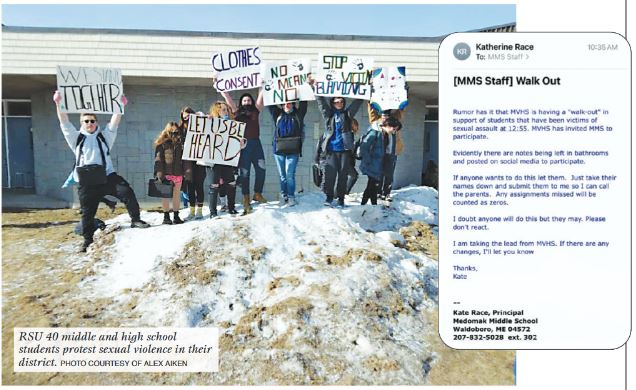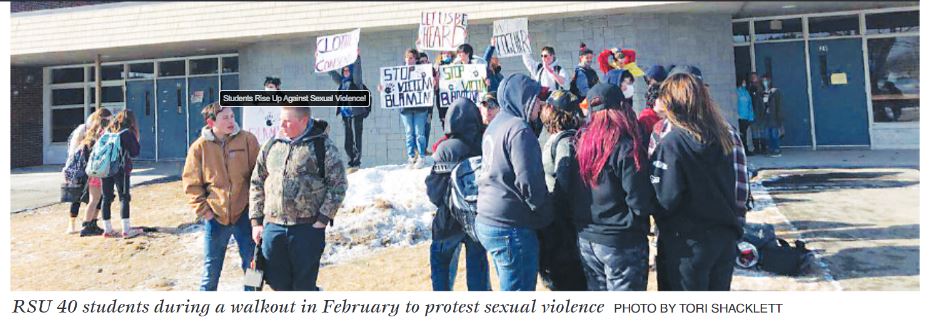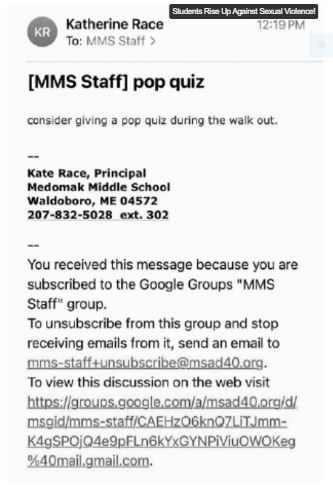by Becca Shaw Glaser March 8, 2022, The Free Press

On February 14 and 15, some hundred Medomak Middle School and Medomak
Valley High School students marched out of school in freezing weather to support student victim-survivors of sexual harassment and assault and to call for changes in the overall culture of the schools. Heartbroken and enraged that young people still have to deal with this, while simultaneously inspired by their bravery and passion, I reached out to interview students who took part. They described a school environment in Waldoboro where sexual harassment and violence feels widespread, and where students’ emotional needs are inadequately cared for.
The protests were initially met with something one might classify as hostility from school administrators. MMS Principal Katherine Race shot off an email to teachers suggesting they whip up pop quizzes to give during the walkouts — seemingly to punish the students for voicing their concerns about sexual harassment and assault in the school she oversees. Following the first walkout, RSU 40 Superintendent Steve Nolan sent an email stating that student participants would be “disciplined” for “safety reasons.” But students question whether their “safety” is truly the top concern for RSU 40. The school district has significant problems with sexual harassment and assault: students told me that within the past year a middle school student was relegated to remote learning after sexually harassing multiple girls. And RSU 40’s recent history includes the resignation of MVHS Principal Andrew Cavanaugh following his alleged continuous sexual harassment of a student, which was, according to a lawsuit filed by the student, enabled by then-MVHS social worker Chuck Nguyen, a co-defendant in the case, and overlooked by other adults at RSU 40. I spoke, over email, with four MVHS and MMS students about the RSU 40 culture at large, and the changes they want to see.
Can you give a small snapshot of who you are — grade, pronouns, things that inspire you? How did the protests get organized? What did it feel like to be part of them?
Sage Cunningham: I’m a high school junior at MVHS, I use they/them pronouns and I’m super into the punk scene as well as punk culture, so protests are kinda something I look up to. I have lived in Maine my entire life. My family inspires me, and looking back on past protests and activism movements shows me that my voice can be heard. Altogether I think most students are looking for awareness on the issue as well as better responses from the staff at both schools. We also have felt that a proper response to our protests would be to start regularly teaching students about consent and teen dating/sexual violence as a whole.
Eliza Luce: I am a sophomore at MVHS. I am a very passionate person. I’m also very expressive, whether that’s with my clothing, drawings, or my poetry. I love music as a whole, but I’m definitely more interested in classic rock and older music. There were many circumstances that led up to the walkouts. It seemed like a fitting time to do these because of V- day and that it would have been right after the Super Bowl, [an event often used by activists] to recognize the issue of human trafficking. I personally was a little nervous because I’m someone who doesn’t really enjoy confrontation. Even through the cold and thoughts about the consequences, I felt like this was absolutely a good thing. People were coming together to recognize a very important issue. We were all working together to get the attention of the public and our communities. I held a sign saying, “People have their own stories.”
Tori Shacklett: I am a senior at MVHS, and use she/her pronouns. It was very cold. But it felt good knowing that those who haven’t been taken seriously know that we believe them and we stand with them. Our hope is for the school to take us seriously, teach about consent and safe sex, as well as taking sexual harassment that is brought to them seriously.
Alex Aiken: I am an 8th grader born and raised in Maine. I listen to many genres of music that I love deeply. I love both eating and making good food. There is nothing I cherish more than my friends (the ones I consider family). The protest got organized earlier in the month when there was a screenshot posted around Snapchat. I heard that there was some prompt to initialize this protesting but I didn’t hear the full story. I definitely felt slightly intimidated by the movement until I heard how many people were attending with me. I felt empowered knowing that I was supporting people I know who have gotten sexually assaulted. There was definitely a lot of friendliness among the crowd. I spent the most part of the beginning 30 minutes holding a “No means No” poster. I also held a “We stand together” sign for the last half of the protest. I believe a message was
successfully sent.
Did any teachers, parents, guardians, administrators, staff participate?
Eliza: Although no teachers or parents participated, the positive reaction of the public, including parents and other important people of our communities, made up for the more negative reaction from some of the administrators.
Tori: The Medomak alternative program teacher Mrs. Borden O’Brien held the high school doors open for students who wanted to go back inside because of the cold.
Alex: No teachers, staff or parents (non–high school attending adults) attended the protest. There was administration attending but they did not support the crowd, but limited and observed us.

What inspired you to do walkouts? Are you in touch with Camden Hills Regional High School students who walked out last October to protest issues of sexual assault and rape culture at their school?
Eliza: I discussed ideas with a few of my friends. We ultimately came up with walkouts. I think we took this idea because it would be a good way to get people’s attention fast, whether that was other students, teachers, or the
community. I have friends from CHRHS [with whom] I have discussed similar complaints we have had about our schools. They helped me with some of the ideas for these walkouts.
Alex: The walkout was to not only notify the community, but to show the school our dedication.
How widespread do you think sexual assault, rape and sexual harassment is at the RSU 40 school district?
Eliza: I know it is widespread — people who are silent and people who may be more outspoken about their experiences. It doesn’t matter, every story is equally as important.
Tori: Pretty widespread.
Alex: Personally, in the Blue wing of the middle school, I find that there is not much sexual harassment. However, when I speak to my friends (who know more people than me) there is sexual assault among other wings. Honestly, in the district as a student I wish I would be supported more by staff for bringing awareness to these issues so we can help solve it.
I was impressed that so many middle school students participated. What is the culture for middle-schoolers as far as sexual assault and harassment?
Alex: I think that some of the students are not supportive enough of this issue. However, I would like to say this. I do know someone who sexually assaulted somebody and they were bullied and beaten up for it. However, no school action was taken to interfere from either side, if that tells you enough about the general community. The culture, as you put it, is too diverse to know who is going to support you and who is going to shame you for coming forward. It was mostly women (from the middle school) who attended [the walkouts] in genuine hopes
to spread a message.
Is the administration really taking this seriously, as they claim? What can they do to improve student safety at the school?
Sage: The school could do better on dealing with this. They have told us that keeping students inside [during the walkouts] was for our safety, meanwhile the middle schooler walkout participants were not allowed inside until the end of the day in temperatures as low as 12 degrees, which is ultimately jeopardizing their safety. During the second walkout, MVHS Principal Linda Pease did not allow MMS students to come into the building with the high school students in order to stay warm.
Eliza: There was probably 10-15 minutes left of 4th period when we had been outside the second day [of walkouts]. People were getting really cold so they asked if we could go sit in the cafeteria until the bell rang to go to buses. So we all went in, including the middleschoolers. But then Mrs. Pease came in and asked if there were any middleschoolers and said that if so, they needed to leave. I thought that was totally unnecessary, especially when their “top priority” was to keep us safe, like they said before.
Alex: The middle school administration is only successfully supportive in jobs that require it, e.g. counselors. The staff does not punish abusers and sexual assaulters harshly enough. They refuse to do anything until almost every gender that is being harassed in the wing has come forward about being assaulted by said student.
What was the punishment for being involved in the walkouts?
Sage: The only punishment I have faced as of this moment is an unexcused absence mark on my report card; that goes for anyone who participated. So far no one has been suspended or anything like that.
Eliza: There were also threats for zeros that we would not be able to make up, but I’m not sure if any teachers enforced this. MMS Principal Mrs. Race encouraged teachers to give pop quizzes during the walkout.

What are the sex-ed classes like at RSU40? At what age do they start, are they LGBTQI+-inclusive, sex-positive, focused on teaching affirmative consent?
Sage: We learned about sex and safe sex in 8th grade. The classes are inclusive of sexuality to some extent. They never really went into detail on how to be safe when having sexual intercourse as a queer person but rather just kind of said, “Gay people exist, it looks like this, and people can like people regardless.” When Linda Pease was asked about the policy on consent she seemed very unsure on what it was and instructed students to ask their health teachers about it.
Tori: I don’t recall learning anything sex-positive; I only remember learning about practicing abstinence.
Could you give examples of gender-based harassment at school?
Sage: One thing I have noticed above anything else is how the dress code plays into the saying “Well, if that’s what they were wearing they were asking for it.” I, as well as other female-presenting students, have been dress-coded for some of the smallest things, like their skirt being shorter than a fingertip length’s
[measurement], bra straps showing, or just wearing a thin-strapped tank top. The school’s dress code policy applies more to feminine-presenting students than masculine-presenting students.
Alex: The dress code is 100% against the women. Nobody ever pays attention to the dress code [in the middle school] unless you’re wearing something absolutely ridiculous or your birth sex is female. I’ve seen some men wear school inappropriate shirts all day, no issue, but when a woman wears something slightly revealing they’re immediately called out and asked to change.
RSU 40 is thought to be particularly not good about supporting gender non-binary and transgender students. Would you say this is true?
Sage: In school I am constantly referred to with the wrong pronouns. Teachers will use the chosen name I have but will very rarely respect the pronouns I use. A few teachers try their best to understand but there are very few. I think there should be some sort of training or education on the teachers’ behalf to help them understand the importance of names and pronouns that students use.
Alex: Many of my friends get deadnamed when called up to the office or something alike.
How do the schools of RSU 40 do in supporting students’ emotional well-being?
Sage: MVHS only cares about mental health when someone almost dies or does die. It makes it feel like the school doesn’t care about students or how they are doing mentally.
Tori: They need to support students’ emotional well-being through everything.
Alex: The school does not support mental health well enough. They mostly only care about you getting your work in and not failing. The school also never recognizes that some people deal with their issues in an unhealthy or even illegal way, and that involving the authorities makes the situation worse.
What are the positives that have come of the walkouts and student organizing on these issues so far?
Sage: They are having resources come to our school to speak with students and teach them about consent. However, they are only making this optional, which worries me and makes me think that while they are trying to help it won’t make a difference.
Eliza: Our voices have been heard by the school administration and the public. The high school has taken notice to the need of talking more about the subject of sexual assault and consent. They have come out and said that they are working on ways to improve this.
What other things would you like to see Medomak Valley High School and Medomak Valley Middle School do a better job of?
Sage: I want the teachers to understand that despite us being teenagers we should still be heard out and talked to or be treated like adults; not many kids get taken seriously because of their age and it’s upsetting.
Eliza: I think the school has so much room for improvement on discussing this issue and support for it. I believe there should be more classes talking about the things surrounding sexual assult and the importance of consent. I have heard from our principal, Mrs. Pease, that she is looking to try to improve this.
Tori: I want them to acknowledge that it happens in the schools, and take people seriously when it gets brought to them. I also want them to teach more about consent and safe sex.
Alex: Acknowledgement that this happens in the school, and that it is not to be taken lightly. A lot of the time these issues are taken very lightly although they can mentally hurt or in rare cases traumatize the young adults of today’s society.
Any other things you think are important for the broader community to know about what it is like being in your generation today?
Sage: Other than the general fact that we don’t “have it easier” or have an easier childhood than the adults did growing up in the community, I feel like it’s important that adults understand we just want to be heard and taken seriously. Not every adult takes a kid or teenagers’ word when they report something. Students just want to be heard.
Becca, once a teenaged riot grrrl whose activism looked like zines, music, and graffiti, wishes the Camden-Rockport schools, rife with gender-based harassment in the ’90s, had been bursting with student walkouts.